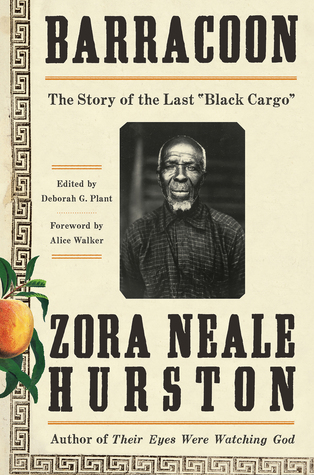Barracoon: The Story of the Last “Black Cargo” – Zora Neale Hurston
Rating: 3 stars*
Cliff Notes: *Full disclosure on my rating – I did not read any of the appendices.
Full Summary: I originally put this book on my TBR because Flea announced it to be the inaugural choice for his book club. I so badly want to be cool, like Red Hot Chili Peppers super fan cool, but honestly – I am more of an Air Supply block party kind of a girl. So my dreams of Flea seeing my review and rocketing me to fame (or my husband not thinking I am a total music dork) were quickly dashed because I was disappointed by this book. Here’s why.
The introduction of the book tells the story. And not from Cudjo Kewis/Oluale Kossula’s point of view – it is more of a 3rd person telling of it. The last third of the book is appendices. Then the middle of the book is Cudjo / Oluale telling it in his own words. That middle section would have been more powerful if it would have let the reader unfold his story. My understanding is that some readers balked at the difficulty they had reading in Cudjo / Oluale’s vernacular. But that is what made it land for me. I felt like the introduction almost spoiled the story for me.
All of that aside, this is a book everyone needs to read. Especially white people. ESPECIALLY white people who say racism is in the past. This was demonstrated for me recently when I was at a community meeting where participants run the spectrum. There were whites, blacks, Native Americans, Samoans, and more. There were homeless people, tech company founders; men and women; teens and retirees.

About a third of the way into the meeting the police came in. The tension in the room changed. Some participants tried to listen to the speaker while some looked nervously between the police and their friends. What I noticed was the difference on the faces of the white people vs the black people. The white people in the room were curious: I wonder what brings the officers in here? The black people had a mix of emotions.
One black man in his 70s looked at the ground and did not look up or look at anyone else until the officers had left. He was unusually quiet the rest of the meeting.
One young black man in his early 20s kept his eyes forward until the police officers approached his table, then he lifted his chin and met the officers with a steely gaze of defiance barely covering fear. His chin was set and I could see his clenched jaw from hallway across the room. Then the officer removed the white homeless guy sitting behind him and you could see him visibly relax into his chair. Later in the meeting he commented on his fear and how rattled he was.
That is why first person accounts of slavery are so important. We cannot pretend it did not happen or that former slaves and their families need to “get over it.” As a white woman I felt – and really could almost smell and touch – the fear in that room. Why are there people who fear another human being like that? That is not ok. Sweeping the experience under the rug actually perpetuates the idea that the problem does not exist. That is not ok.
We need for conversations to take place. Hard conversations. We need to read books that are hard to read – for writing and for content. If you think it is hard to read about slavery, imagine being the slave. How can we not witness that. To hide it to condone.